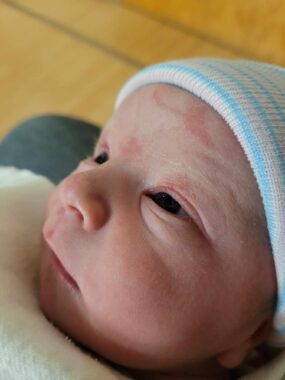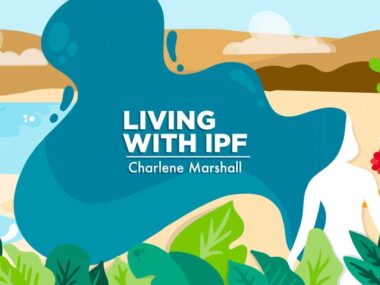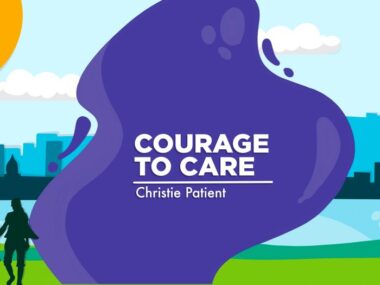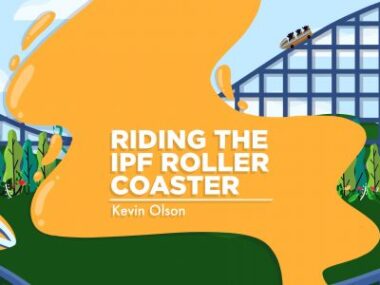Navigating emotional ups and downs on my IPF journey
Recent events have caused me to hit both ends of the mood spectrum
Written by |

Buckle up. The past three weeks have been an emotional roller coaster for me. On a scale of -10 to 10, I’ve hit both extremes.
I’m no stranger to emotion; some would say I wear my heart on my sleeve. During my journey I’ve had some huge emotional ups and downs, beginning with my diagnosis of idiopathic pulmonary fibrosis (IPF) in January 2017:
- The birth of my first granddaughter, Abigail, in January 2018
- Signing the documents for my funeral and cremation when death seemed close
- Receiving the call that lungs were available, and my bilateral lung transplant in July 2021
- Grieving for my donor and their family then and now, on each anniversary of my transplant
- The birth of my second granddaughter, Charlotte, in May 2022
- My brother Mark’s IPF diagnosis last month
- Followed 10 days later by the birth of my third granddaughter, Brooklyn Ann.

Sam Kirton recently welcomed his third granddaughter, Brooklyn Ann. (Courtesy of Sam Kirton)
One thing I’ve learned over the years is that I have to let my emotions escape. I cannot keep them suppressed, as that can harm my mental and physical health. If you’ve seen the story that Richmond, Virginia, station WTVR CBS 6 News produced, “Sam’s Purpose: Make Every Breath Count,” you know I don’t try to hide my emotions.
I think that’s the reason I embraced my diagnosis. I could’ve chosen denial, but the consequences would’ve made my journey more difficult. Keeping a positive attitude has proven to be the right choice for me. It’s also been helpful when dealing with others who are newly diagnosed or having difficulty navigating this disease.
A low, followed by a high
Now I must put emotion aside as I deal with my brother Mark’s diagnosis. It starts a new chapter in my journey and renews my search for answers. The cause of my IPF was never established, and now one of my primary questions is whether there’s a genetic component to this disease Mark and I share.
If there is, does it extend to every blood relative? IPF is a chronic, progressive disease with no cure. In the coming weeks, I’ll spend time crafting a letter to relatives far and wide. While I don’t want to be an alarmist riding my steed through the streets shouting, “IPF is coming! IPF is coming!,” I do feel a need to help educate the broader family. I want them to consider sharing this information with their primary care physician. The earlier this disease can be identified, the greater the opportunity for a patient to make informed decisions about their future.
On the other end of the emotional spectrum is the birth of Brooklyn Ann. When I was diagnosed, I had no grandchildren and wasn’t sure I’d ever get to meet any. Now, I have three granddaughters. I haven’t held Brooklyn yet, but I was able to FaceTime with her on the day she arrived home. She wasn’t much of a conversationalist. I suspect she was tired, as her delivery involved 24 hours of labor for Mom.
How do you manage emotional ups and downs on your journey? What are your best coping techniques? I’d love to hear from you in the comments. It will make us all better, and I know it will help me make every breath count.
Note: Pulmonary Fibrosis News is strictly a news and information website about the disease. It does not provide medical advice, diagnosis, or treatment. This content is not intended to be a substitute for professional medical advice, diagnosis, or treatment. Always seek the advice of your physician or other qualified health provider with any questions you may have regarding a medical condition. Never disregard professional medical advice or delay in seeking it because of something you have read on this website. The opinions expressed in this column are not those of Pulmonary Fibrosis News or its parent company, Bionews, and are intended to spark discussion about issues pertaining to pulmonary fibrosis.








Jan S Rosin
Dear Sam,
I received my diagnosis of interstitial lung disease tied to schleroderma two years ago. I have also wondered if there is a genetic component because my Mother suffered from breathing issues for several years before her death, but there was never a good diagnosis.
I have experienced the emotional ups and downs also. At the very beginning I was utterly terrified and felt helpless. But, I am determined to fight this to the end. I use every tool at my disposal and take advantage of all pulmonary therapy I can get. It has helped. It is possible to improve with hard work. This experience also clarified just what is most important to me in my life. For me it is my family. My husband and I are moving to another state so we can be more involved in our grandchildrens' lives and get help when times get really tough later on. I have always been pretty determined, but now I am indomitable. Hang in there.
Samuel Kirton
Jan,
Thanks for reading my column and your comments. I have always believed that attitude is a huge component of my journey. A positive attitude has definitely helped me.
Sam ...
Mary Echberg
I was diagnosed with IPF on the 28rh October 2015. I was extremely distraught especially when the CPAP machine and oxygen concentrator
arrived and I could only look at them in dismay. It took me a couple of weeks to bite the bullet and use. Two - three years into the diagnosis my mind was on the three to five year life span and decided to get a second opinion from Professor …. Respiratory physician and surgeon who changed my diagnosis to ILD / Interstitial lung disease. I was so relieved as you could imagine. My emotional roller coaster didn’t stop there. Lat year I broke my back and hospitalised for about 3.5 months followed by 3-4 admissions with chest infections and Covid which I am now requiring oxygen 24/7. This year I fractured my neck of femur which dislocated a month later. Having a general anaesthetic was also traumatic and I can never have another one. Apart from all this I am very happy and content living with the consequences and I put this down to being a very positive person of 76 years with a very supportive family.
Deborah Klein
Sam,
I must have missed this column and I'm said to see there may be a familial connection. While my late husband was supposedly the only family member with IPF, I wondered if his mom, who passed in the 80s only had lung cancer or did she also have PF? If anyone can research your possible connection, it's you. I'll be curious to see what you find.